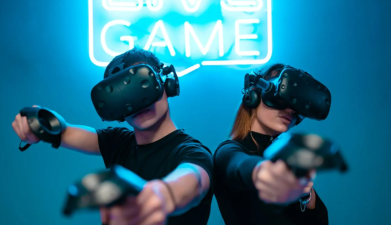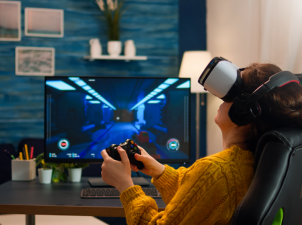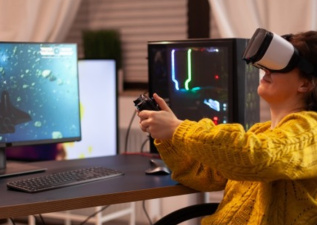As a disruptive innovation in the digital age, virtual reality (VR) technology is reshaping the form and boundaries of the entertainment industry. From games, movies and TV to cultural and travel experiences, VR has provided unprecedented possibilities for human entertainment with its triple breakthroughs of immersion, interactivity and imagination. However, the maturity of technology, the lack of content ecology and the cultivation of user habits are still bottlenecks for its full popularization.
As a disruptive innovation in the digital age, virtual reality (VR) technology is reshaping the form and boundaries of the entertainment industry. From games, movies and TV to cultural and travel experiences, VR has provided unprecedented possibilities for human entertainment with its triple breakthroughs of immersion, interactivity and imagination. However, the maturity of technology, the lack of content ecology and the cultivation of user habits are still bottlenecks for its full popularization.

The collision of virtual reality and AI:
The rise of a new entertainment model
Virtual reality allows people to enter a realistic three-dimensional world through a highly immersive experience, while AI gives these virtual spaces intelligence and interactivity. The combination of the two is shaping a new entertainment model.
- The comprehensive evolution of games
VR games have become the forerunners of this technological change. The AI-enabled virtual world not only provides lifelike characters, but also can adjust tasks, environments and plots in real time. For example, AI will change dynamically according to the player's behavior, making each challenge full of novelty. This "adaptive" design is subverting the limitations of the fixed mode of traditional games, allowing every player to experience a "tailor-made" adventure journey.
- The personalized revolution of music and movies
Virtual concerts have become a reality. No matter where you are on the planet, you can interact with virtual idols at "zero distance" by wearing VR equipment. Movies have also moved from fixed narratives to interactive experiences due to the addition of AI. Audiences can personally participate in the development of the plot and even decide the direction of the story. Every viewing is a new experience.
- Deep virtualization of social scenes
In virtual reality, AI-driven virtual characters can imitate real human behavior and have real-time conversations and interactions with users. In the future, people may be able to collaborate with colleagues far away in virtual conference rooms, or hold large gatherings through virtual social platforms. This interactive method will reshape the boundaries of interpersonal relationships.
Infinite possibilities of future entertainment:
Opportunities and challenges coexist
The boundaries between virtual and reality disappear
With the continuous maturity of VR+AI technology, the boundaries of entertainment will be completely broken. Whether it is experiencing the splendor of ancient civilizations or traveling through the fantasy of the future world, people will be able to realize any imagination in the virtual world. However, the more realistic the virtual experience is, will people's need for reality gradually disappear?
For example, a person who is not good at socializing in real life may establish a deep "friendship" with an AI character in the virtual world. When satisfaction provided by the virtual world exceeds interaction in real society, will there be a large-scale "escapism" phenomenon? This trend may make society more divided, and even make people gradually lose the ability to interact with reality.

Control and abuse of technology
Highly intelligent AI and realistic virtual worlds may bring ethical and legal challenges:
- Data privacy: The virtual world requires massive user data support, and every move of users may be recorded. Will this all-round monitoring lead to the complete disappearance of privacy?
- Bias and manipulation: If AI algorithms are abused, will certain biases or guiding behaviors be implanted in virtual entertainment, thereby manipulating the thoughts and behaviors of the public?
- Virtual identity issues: When virtual characters interact deeply with real users, should they also enjoy certain "rights"?
Risk of social differentiation
High-end VR+AI equipment is expensive, and the threshold for using technical services is high, which may aggravate social differentiation. Users with better economic conditions may be able to swim in the most advanced virtual world, while people with limited resources may be forced to "outside". Will this digital divide make entertainment also a manifestation of social inequality?
Human psychological and spiritual challenges
- Obsession and addiction
The high immersion and flexibility of the virtual world may make people deeply trapped in it. Similar to today's online game addiction, VR+AI entertainment in the future may evolve into a more complex psychological problem. Addiction to virtual life may cause mental health problems such as anxiety, loneliness and even depression.
- Redefinition of human identity
When the virtual world becomes as real as the real world or even better, how should we define "self"? Does the virtual image also become part of the identity? Will humans get lost in the gradually blurred boundaries between reality and virtuality?

Coping with the future:
Technology should serve humans, not replace reality
The combination of VR and AI has certainly brought unlimited possibilities to the entertainment industry, but it is by no means the ultimate answer. In the future, we need to look at this change with a more rational attitude:
- Parallel science and technology and ethics: Establish a strict legal framework to ensure that AI and VR technologies are regulated in terms of data privacy, user rights and interests.
- Improve the public's digital literacy: Help more people understand the potential and risks of technology, narrow the digital divide, and let the future of entertainment benefit more people.
- Human-centered design: Let AI and VR become tools to serve human happiness, rather than means to escape reality. Technology should supplement reality, rather than replace it.
Conclusion:
The future of entertainment needs to return to the original intention of life
The combination of virtual reality and AI has indeed opened a door to the future for the entertainment industry. However, we cannot let the virtual world cover up the beauty of real life. Future entertainment forms should help us explore more possibilities in life, rather than gradually moving us away from the essence of life.

